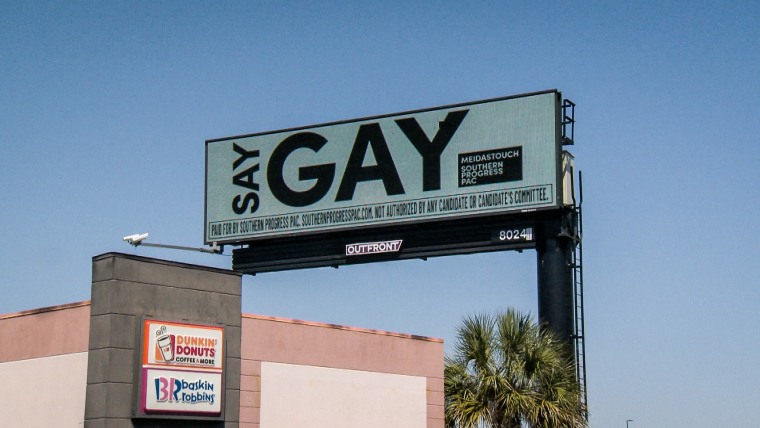A group of determined New Jersey students defiantly staged a walkout in protest against a new policy that stops them from flying an LGBT+ Pride flag.
About 40 students, some wearing kaleidoscopic coloured items, in Passaic, New Jersey, took to the streets on Monday (28 March) for the right to fly the Pride flag, NJ.com reported.
The Passaic board of education recently enacted a policy that bans flag displays on school grounds with exceptions for the American flag, New Jersey state flag and school flags.
But students want to be able to raise the LGBT+ Pride flag. Several stood in front of the city’s three high schools and chanted “walk out” to encourage others to join in the protest against the new policy.
The brave students also called on school officials to allow them to “raise our flag”. The protest eventually moved from the schools to City Hall and then the board of education building.
Amari Gawthney led the group down to City Hall and declared “we’re not going to stop until we get what we want”.
“We put up the flag last year with no problem,” Gawthney said. “Then this new policy came from out of the blue, and they pushed it under the rug, actually.”
Last June, students in Passaic were allowed to raise the LGBT+ flag on school grounds for the first time to celebrate Pride Month. Flag displays were permitted until November when a group of community members questioned the school board on why the Pride flag was allowed to fly.
The board’s vice chairman L Daniel Rodriguez said it was easier to enact a blanket ban because it was “one of those issues [where] we want to make sure we were fair to everyone”, NJ.com reported.
Camila Perez, a freshman in Passaic, wore a rainbow flag as she spoke before trustees at a school board meeting last week. Perez argued the blanket ban is “unfair” and “discriminates” against the queer community.
“It bothers me, and it bothers the whole community,” Perez said.
The students at the protest called on the school board to rescind the policy and allow them to fly the LGBT+ flag in time for Pride Month, just two months from now.
Jaylie Barrett, a senior at Passaic PREP, argued the board “disrespected us as a community” and “won’t tell us why” they changed the policy.
Students across America have staged mass walkouts in protest of LGBT+ hate in the education system, discrimination against queer students and increasing restrictions on displays in support of the LGBT+ community.
Last year, teens at Winterset High School in Iowa left school to protest the suspension of a teacher who revealed he was bisexual.
Students across America are staging mass walkouts to protest LGBT+ hate in the education system, and schools are finding them harder and harder to ignore.
A short while later, hundreds of students in Texas marched out after a lesbian teacher was allegedly escorted off campus amid a row over stickers used by educators to show their classrooms were a ‘safe space’ for LGBT+ students.
Recently, the student organiser of massive school walkouts across Florida was suspended for distributing Pride flags during protests against the state’s ‘Don’t Say Gay’ bill.
Jack Petocz, a junior at Flagler Palm Coast High School in Florida, said he was “proud of who I am” and proud of all those who are “protesting these regressive bills”.
He called on students to “let our politicians know that no matter how hard they try, they cannot suppress our identities or silence our voices”.
“Gen Z will not stand idly by as our rights are stripped from us,” Petocz said. “It is now up to you to decide which side of history you will be on, the side that empowers us or the side that seeks to erase us.”


